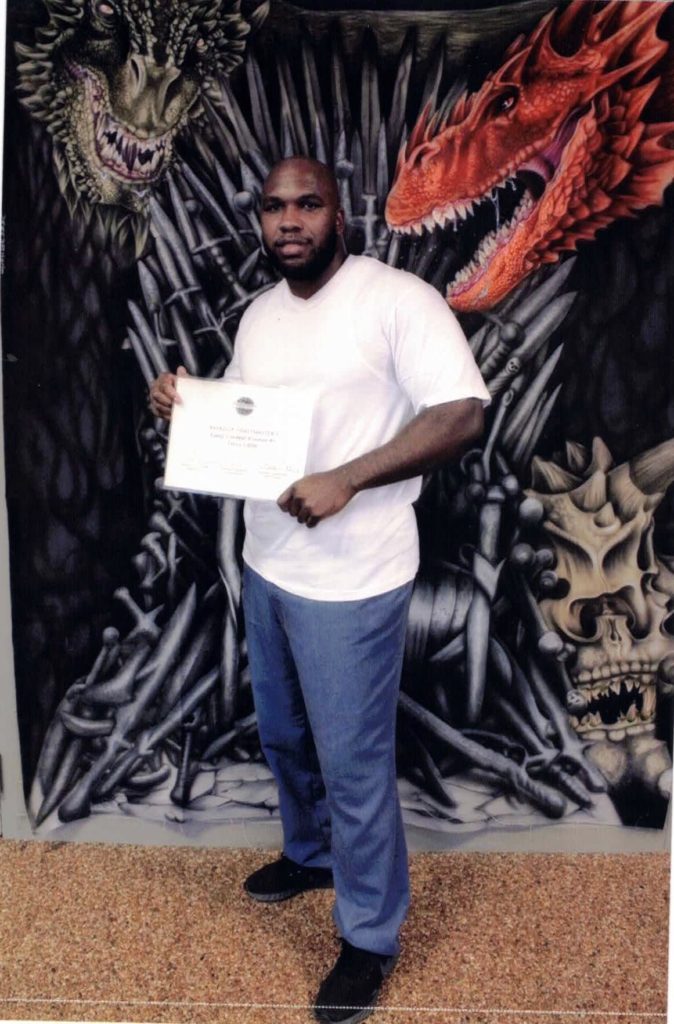Throughout my years of incarceration (and I’m sure others can attest to this), challenges frequently arise. Challenges, such as how to handle uncertain predicaments; for instance, when encountering another inmate who has a quarrel with you, one you never knew existed; or dealing with the loss of a loved one that you discovered passed a week prior to you learning the news; or having an issue with a corrections officer. Well, in 2016, the latter was a challenge I found myself dealing with.
The incident occurred on a day that wasn’t so uncommon, as things were known to occur in spurts and take place without a prisoner’s knowing of them prior. This day, we were being issued phone tablets for our personal use. A lot of assumptions had gone around the prison as to why we were serendipitously being given the tablets. One theory was that guys had been complaining all the way to the top to those in control of prison operations that they weren’t being afforded adequate time to use the payphones, or they were too afraid to dictate they were next in line for fear of being physically assaulted. Another reason, an indubitable one at that, was the phone company provider was doing it to make up for the money it lost when it got rid of the outrageous phone call charges it had previously ascribed to inmates. Whatever the reasons, both were equally plausible.
My cellmate and I were summoned downstairs together where an operation had been set up to distribute the tablets. The distributors consisted of prison officials, corrections officers, and employees of the phone service provider. They were all located at different tables, handling different tasks. While the phone service provider employees distributed the tablets and headsets, prison officials and staff were taking prisoners’ signed proof of accepting responsibility of the tablets. Originally, I was skeptical of the process; I believed that the issuing of these tablets with cameras in them was another tactic by prison officials to spy on us. However, when I thought about it, prisons had more information about their prisoners than many prisoners knew about themselves. My suspicions were later placated by my rational discernment of the general process.
My cellmate and I made our rounds, first giving the phone service providers our prison numbers and our names to allow them to put this in their system. Again, I treated this moment as another day in prison. My cellie on the other hand was overcome with joy with the thought of being able to call his girlfriend while in the cell. We then made our way to an isolated table occupied by two prison guards: one was a white guy in his mid-sixties, the other a woman in her mid- to late-forties who reminded me of Goldie Hawn in her early acting years. We took our seats opposite one another and next to the officers. Again we gave our numbers and names, then we were given sheets of paper. Fueled by my decision to accept the tablet and set aside my concerns of its potential motives, I signed my name on the first line without reading the form. I flipped it over and noticed the words in bold black letters above: WAIVER FORM. They were words I had seen before but never fully understood, because prior to my incarceration I had never been in trouble to the degree in which I had to understand their meaning. If you don’t know what I mean, then please stay out of trouble. Now those words are clear: I understand they mean to relinquish something you have control of. In my current transaction, this meant that I was giving up my right to not care about what happens to the tablet by accepting it as my possession. And I was okay with that, but there was more text on the paper than I had realized, and I didn’t want to make the mistake of accepting something without knowing the exact ramifications. While I paused to read the paperwork, the male officer interrupted my concentration.
“What are you doing?” the disgruntled male officer asked. I kept my eyes on the paper, not thinking it was a problem to do so.
“I’m reading the fine print,” I retorted.
The male officer chuckled, then said in rebuke, “You do know you’re supposed to read a waiver form before you sign it… don’t you?”
“I made a mistake in doing so,” I told him. I could hear the vex in his voice, but I just ignored it. However, my reaction wasn’t one he wanted.
“Well, you might as well finish signing it so that your son can inherit it when he comes to prison.”
The asperity of his words caused me to look up; I had been caught by surprise, so much so that I stared at the female officer to seek answers for her partner’s deliberate verbal assault. When she didn’t react right away, I began thinking, Maybe this is a joke every officer plays on prisoners. But, no, her eventual expression confirmed my bottled feelings of rage. Her mouth fell agape in shock.
“Why would you say that?” she interrogated.
The male officer shrugged his shoulders, standing firm to his comment. “It’s true,” he said.
I was still stuck, because not even the woman’s disapproval caused him to recant his harsh comment. I knew then I had to say something.
“Well, luckily I don’t have any kids to inherit it,” I said, trying to maintain an aloof composure. And yet, the boomer wouldn’t yield.
“When you get out you’ll have some, and when they’re old enough, they’ll be here to receive it,” he continued. But this time I was quicker on my feet, this time the sorrow of my incarceration wasn’t dismay, this time it was a weapon to show that I was mentally free.
“…Eee, that’s going to be a problem also,” I said.
The male officer finally stared me in the eyes like I was a man who was unbroken by his words and my circumstances.
“How come?” he asked.
“I was sentenced to life.” The revelation depleted the amusement he had previously reveled in.
At that moment, I knew I was a man with a purpose, despite my subjugation. I had staved off any anger that had any intention of rising and allowed my circumstances to become my prophylactic against this guy’s childish, hate-filled insult. That night I lost no sleep, however, there was a moment when I sat up and thought about the hate we as a society possess, because that officer isn’t alone. If it continues, we will recklessly, inadvertently share this hate with our future generations, as has been the case in generations past. It must change. It won’t happen all at once, this I know, but one at a time it can. This officer’s comment was a challenge that tested my individual change, and for that my power for change prevailed… You’re next. One step at a time, one individual at a time.
Peace.





No Comments